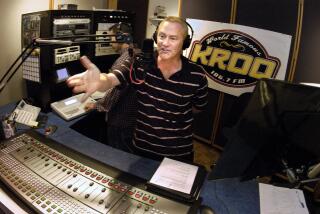Radio Korea Boosts English Programming : Media: Instead of two hours a week, KBLA now offers two hours each night. The format of talk, music and interviews is aimed at attracting young listeners, many of whom may speak little or no Korean.
- Share via
Ethnic radio stations prosper in Los Angeles by broadcasting to millions of immigrants in their native languages. But Korean-language station KBLA (1580 AM) is taking a new approach to reach Korean Americans: English-language programs.
Radio Korea has expanded its weekly English program, begun in January, to two hours of English talk and music shows aired every night.
KBLA is betting that younger Korean Americans not fluent in Korean, along with other Asian Americans, will drive the station’s long-term growth. “Almost half of the 500,000 Korean families in Southern California no longer speak Korean as their first language at home, and we don’t want to lose them,” said Radio Korea president Jay Lee.
While younger Korean Americans may speak little or no Korean, Lee and others at the station believe that they maintain interest in their culture.
Talk shows, for instance, feature Asian American celebrities or community activists, and music programs include Korean and Japanese pop songs as well as American ones.
“We want to create a space for guests and issues that white radio would not want to cover or be interested in dealing with,” said Philip Chung, who co-hosts “Cafe S(e)oul,” an irreverent weeknight talk show.
“Cafe S(e)oul” is a rambling--Chung says intentionally--and wacky two-hour show that reflects the eclectic tastes of its hosts and seeks to grab the attention of younger, hipper Asian Americans.
Each show opens with Lionel Hampton’s version of “Take the ‘A’ Train,” then moves into several minutes of conversation among the hosts, Shaun Lee and either Chung or Larry Tazuma, a Japanese American writer, on anything from their love lives and haircuts to their opinions of Korean American comic and sitcom star Margaret Cho.
Live interviews with guests are followed by listeners’ calls. Guests have included George Takei, who played Sulu on “Star Trek,” and Amy Hill, who plays the grandmother on Cho’s show, “All-American Girl.”
Based on the two to 20 callers they get nightly, the hosts say that most of their listeners are college students or working people in their 20s.
Because it is one of only two Korean-language radio stations in Los Angeles, KBLA has no trouble selling advertising time to Korean businesses, Jay Lee said. It has not calculated the size of its audience, he said.
The station also has yet to aggressively seek advertisers for the English programs. So far, a church and restaurant are the only two businesses that have bought English ads.
That sometimes leads to awkward on-air sequences. A public service announcement on drug abuse is often followed by the restaurant’s commercial, which pushes its flat-rate, all-the-beer-you-can-drink happy hours.
Some of the station’s longtime listeners have complained about the English shows, Jay Lee said. He said many of the complaints came from those who felt younger Koreans should learn to speak Korean, and some were from Korean-speaking shopkeepers who listened to the station while working at night.
But Jay Lee is committed to keeping the programs. “This generation needs this, and they are our future,” he said.
More to Read
Sign up for Essential California
The most important California stories and recommendations in your inbox every morning.
You may occasionally receive promotional content from the Los Angeles Times.













